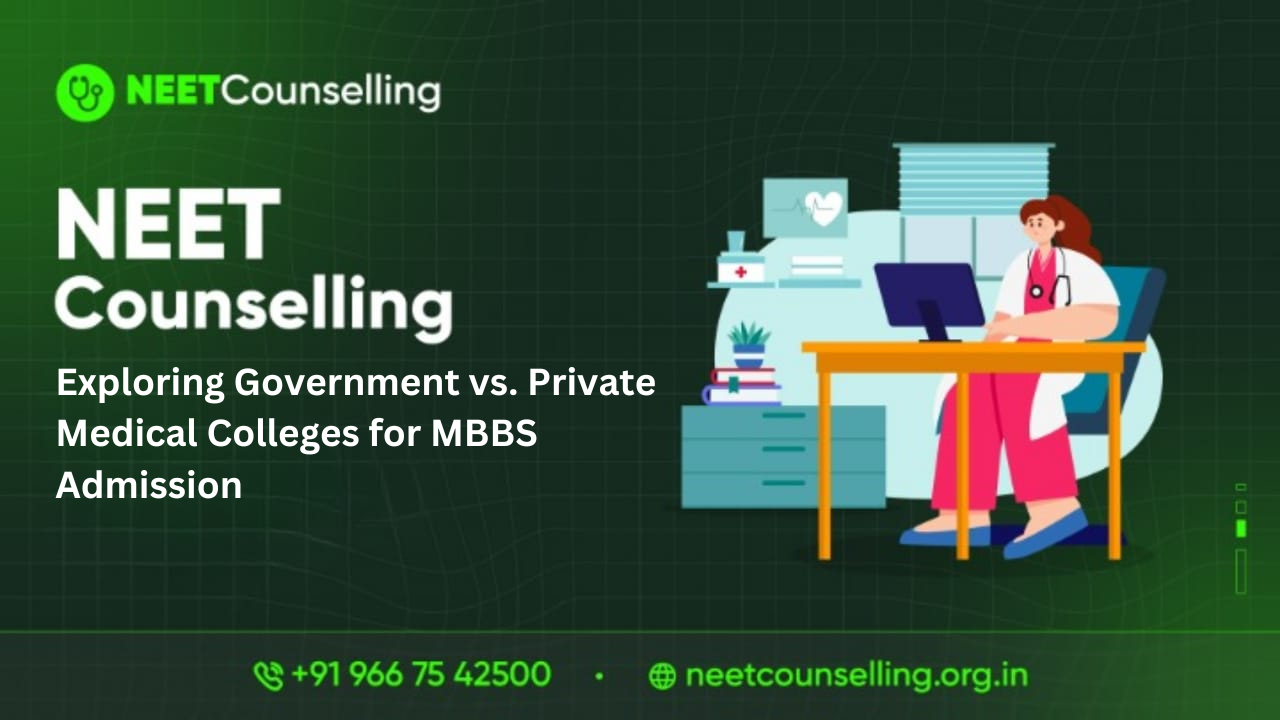Exploring Government vs. Private Medical Colleges for MBBS Admission requires a close examination of various factors. Cost is a major concern. Government colleges boast significantly lower fees, often coupled with scholarship opportunities based on merit or need. Private colleges, while offering modern facilities, come with a hefty price tag. Scholarships might be available, but they are typically less prevalent. Beyond cost, the quality of education is paramount.
Government colleges often have a long-standing reputation and experienced faculty. Infrastructure might be slightly dated, but the focus remains on strong clinical training due to a high patient volume. Private colleges, on the other hand, might have newer infrastructure and advanced technology. Faculty qualifications can vary, but some private colleges attract renowned doctors.
Choosing the right medical college is a crucial step towards your MBBS dream. Two primary options stand out: government and private colleges. Each offers a unique set of advantages and considerations.
Contents [show]
Why Your Choice Between Government and Private Medical Colleges Matters?
Although getting an MBBS seat is an amazing accomplishment, the journey doesn’t stop there. Your future professional route, financial situation, and educational experience are significantly impacted by the college you choose. Here’s why carefully considering government vs. private colleges is crucial:
- Financial Investment: Government colleges offer a much lower financial burden. Their fees are significantly lower, and scholarships are often readily available. Private colleges, while offering modern facilities, come with a hefty price tag. Scholarships might exist, but they are typically less prevalent.
- Quality of Education: Both paths offer excellent education, but the focus and environment differ. Government colleges often have a long-standing reputation with experienced faculty. Their focus might be on traditional clinical training due to a high patient volume, which can be invaluable for practical experience. Private colleges might boast newer infrastructure, advanced technology, and potentially smaller class sizes. Faculty qualifications can vary, but some attract renowned doctors who may offer a more research-oriented approach.
- Exposure and Opportunities: Government colleges typically have a larger patient pool, exposing you to a wider range of medical cases. You can improve as a physician and patient care provider by gaining a great deal of clinical experience. On the other hand, a more controlled patient flow at private universities might allow for more customized care. Furthermore, some private universities might have stronger business relationships, which could result in more opportunities for internships or job placements.
Government Vs Private MBBS Colleges
| Factor | Government Colleges | Private Colleges |
|---|---|---|
| Fees & Scholarships | Significantly lower fees, scholarships readily available (merit & need-based) | Higher fees, scholarships less prevalent and may cover less cost |
| Faculty & Infrastructure | Experienced faculty, focus on strong clinical training, infrastructure might be slightly dated | Newer infrastructure, advanced technology, faculty qualifications can vary (some attract renowned doctors), potentially smaller class sizes |
| Seat Availability & Reservations | Limited seats, highly competitive, reservation systems for specific categories | More seats available, reservation systems might exist but to a lesser extent |
| Location & Patient Exposure | Often located in established medical hubs, exposure to a wider range of medical cases due to high patient volume | Location varies (urban or rural), potentially more controlled patient flow, range of cases might be slightly less diverse |
| Hostel Facilities | Basic amenities, shared rooms, common dining halls, lower cost | Wider range of options (single rooms, en-suite bathrooms), modern amenities (gyms, pools), higher cost |
| College Life & Extracurricular Activities | Vibrant & diverse campus life, extracurricular activities might be less prevalent | Stronger focus on extracurricular activities (clubs, societies, events), potentially smaller & less diverse student body |
Factors to Consider When Choosing Between Government and Private Medical Colleges
Choosing between government and private medical colleges is a significant decision that requires careful consideration. Here are some key factors to weigh in on:
1. Fees and Scholarships:
- Government College Fees and Scholarships: Government colleges offer a significant financial advantage. Their fees are considerably lower, making them a much more accessible option. Additionally, government colleges often provide scholarships based on merit or need, further easing the financial burden.
- Private College Fees and Scholarships: Private colleges, while offering modern facilities, come with a hefty price tag. Scholarships might be available, but they are typically less prevalent and may not cover as much of the total cost.
2. Quality of Education:
- Faculty and Infrastructure in Government Colleges: Government colleges often have a long-standing reputation with experienced faculty. Their infrastructure might be slightly outdated, but the focus remains on strong clinical training due to a high patient volume. This translates to significant practical experience in various medical cases.
- Faculty and Infrastructure in Private Colleges: Private colleges, on the other hand, might have newer infrastructure with advanced technology and potentially smaller class sizes. Faculty qualifications can vary, but some private colleges attract renowned doctors who may offer a more research-oriented approach. Additionally, private colleges may have more modern teaching methods.
3. Seat Availability and Reservation System:
- Government MBBS Seats and Reservations: Government colleges typically have a limited number of seats, making them highly competitive. Additionally, government institutions often have reservation systems for specific categories, further reducing the number of open seats.
- Private MBBS Seats and Reservations: Private colleges generally have more seats available compared to government colleges. However, reservation systems might also be present, albeit to a lesser extent.
Frequently Asked Questions
Q: Which is more affordable, government or private medical colleges?
Government colleges are significantly cheaper. They have lower fees and often provide scholarships based on merit or need, making them a more accessible option financially.
Q: Do private colleges offer scholarships?
Yes, some private colleges offer scholarships. However, they are typically less prevalent than in government colleges and may not cover as high a percentage of the total cost.
Q: Do government colleges offer a better education than private colleges?
Both government and private colleges can provide excellent medical education. Government colleges often have a strong reputation and experienced faculty, with a focus on practical clinical experience due to high patient volume. Private colleges might have newer infrastructure and potentially smaller class sizes, allowing for more personalized attention. The best fit depends on your learning style preferences.
Q: How important is faculty experience?
Experienced faculty can be invaluable for guidance and mentorship. However, don’t discount the potential benefits of exposure to cutting-edge research offered by some private colleges with renowned doctors.
Q: Is it harder to get into government medical colleges?
Government colleges typically have fewer seats compared to private colleges, making them highly competitive. Additionally, they often have reservation systems for specific categories, further reducing the number of open seats for the general category.
Q: What are my chances of getting into a private medical college?
Private colleges generally have more seats available, increasing your chances of admission. However, the cost might be a significant factor to consider.
Q: Do private colleges offer better hostel facilities?
Private colleges often provide a wider range of hostel options with more modern amenities compared to government colleges. However, these come at a premium price.
My name is Rajesh Mishra. For the past 18 years, I have been helping students get admission into the right colleges. I believe that even students with average or low ranks deserve admission in good colleges—without chasing agents, falling for false promises, or paying donations.
To share my experience and guidance with more students, I write blogs on NEET, Engineering, and AYUSH counselling.
You can connect with me directly through social media and other platforms.


